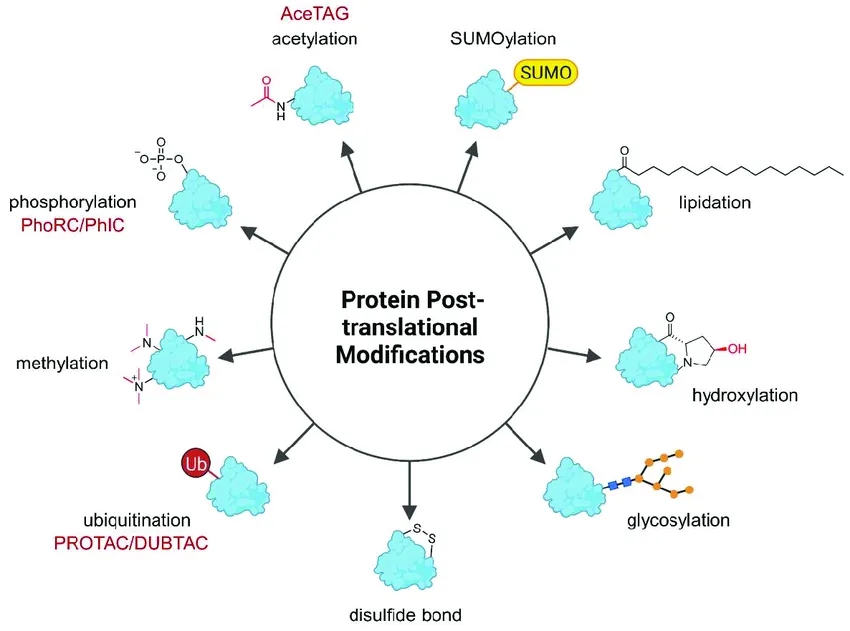Other Post-Translational Modification (PTM) Proteomics Service
Post-translational modifications (PTMs) are essential biological processes that regulate protein activity, localization, and interactions. Beyond phosphorylation, modifications such as ubiquitination, acetylation, glycosylation, and methylation dynamically influence protein function and play crucial roles in cell signaling, metabolism, and disease progression. However, analyzing these non-phosphorylation modifications has historically been challenging due to their low abundance, high heterogeneity, and dynamic nature.

Heitel, P. et al. Molecules. 2023.
Figure 1. Common Types of Protein Post-Translational Modifications
MtoZ Biolabs’ Other Post-Translational Modification (PTM) Proteomics Service utilizes state-of-the-art mass spectrometry and multi-dimensional enrichment strategies to offer high-precision modification site identification and quantification. Our customized solutions help researchers and pharmaceutical companies investigate the molecular mechanisms of protein functional regulation, supporting disease research, drug development, and biomarker discovery.
Technical Principles
Our Other Post-Translational Modification (PTM) Proteomics Service combines high-resolution mass spectrometry (LC-MS/MS) with advanced enrichment techniques to identify and quantify non-phosphorylation PTMs with accuracy. By using specific antibodies, chemical labeling, and enzyme digestion, we effectively capture low-abundance modified peptides. For example, ubiquitination is enriched using K-ε-GG antibodies, glycosylation is separated via hydrophilic interaction chromatography (HILIC), and acetylation is enhanced by chemical derivatization. These strategies enhance the sensitivity and comprehensiveness of modification peptide detection.
Analysis Workflow
From sample preparation to data analysis, our Other Post-Translational Modification (PTM) Proteomics Service follows a standardized quality control system while also offering flexibility to meet custom requirements.
1. Sample Preprocessing and Quality Control: We optimize lysis conditions to preserve modification integrity.
2. Targeted Enrichment and Fractionation: We use antibodies, lectins, or chemical probes to enrich target modified peptides and reduce sample complexity.
3. High-Precision Mass Spectrometry Analysis: Equipped with high-resolution mass spectrometers, we ensure precise identification of peptide sequences and modification sites.
4. Data Analysis and Functional Annotation: Using advanced software, we map modification sites and integrate pathway analysis and interaction network construction to derive biological insights.
5. Comprehensive Reporting and Interpretation: We provide detailed reports including modification site maps, differential analysis, and functional associations.

Why Choose MtoZ Biolabs?
· Highly Sensitive Detection: Detects modification peptides at fmol levels, ideal for small samples.
· Broad Spectrum Modification Coverage: Analyzes dozens of modification types, ensuring comprehensive functional insights.
· Dynamic Quantification: Leverages TMT/iTRAQ labeling or label-free strategies for accurate cross-sample modification comparisons.
· Comprehensive Quality Control: Rigorous quality checks from sample handling to data analysis ensure reliability.
· One-Time-Charge: Our pricing is transparent, no hidden fees or additional costs.
· High-Data-Quality: Deep data coverage with strict data quality control. AI-powered bioinformatics platform integrate all proteomics analysis data, providing clients with a comprehensive data report.
Sample Submission Suggestions
1. Sample Types
Serum, plasma, urine, tissue extracts, and other biological samples.
2. Sample Volume
At least 20 μg of protein or an equivalent amount of cells or tissue.
3. Sample Preservation
Store samples at -20°C or lower to prevent degradation, avoiding repeated freeze-thaw cycles.
Note: Provide details on the target modification type and sample information in advance to ensure the most appropriate enrichment and detection methods are used.
Applications
The Other Post-Translational Modification (PTM) Proteomics Service serves as a pivotal tool for advancing research across diverse fields, enabling systematic exploration of non-phosphorylation modifications in disease mechanisms, therapeutic development, and clinical diagnostics. Below are representative scenarios where our platform delivers transformative insights:
1. Disease Mechanism and Target Discovery
· Cancer Biology: Investigating the role of ubiquitination in cancer resistance.
· Neurodegenerative Diseases: Studying acetylation’s impact on protein aggregation in Alzheimer’s disease.
· Metabolic Diseases: Exploring glycosylation’s role in insulin signaling.
2. Drug Development and Efficacy Evaluation
· Screening compounds for their effects on non-classical modification pathways.
· Evaluating epigenetic drugs’ impact on histone modification patterns.
3. Biomarker Development
· Cancer Biomarkers: Developing early diagnostic models based on glycosylation profiles in plasma exosomes.
· Cardiovascular Diseases: Evaluating protein nitration levels in urine as a cardiovascular disease risk marker.
FAQ
Q1: How can high-abundance proteins in complex samples, like tumor tissues, interfere with low-abundance modification signals?
We use multi-level fractionation strategies to minimize background interference. High-abundance protein removal kits and subcellular fractionation techniques pre-enrich target protein groups, while modification-specific enrichment and peptide fractionation enhance low-abundance modification detection. Our MS methods also employ dynamic exclusion and PRM to ensure high data quality.
Q2: How do you analyze functional priorities when multiple modification sites are found on the same protein?
Our Other Post-Translational Modification (PTM) Proteomics Service provides a comprehensive data-to-mechanism analysis, using evolutionary conservation, domain localization, and dynamic modification interaction network modeling to identify key functional sites and regulatory hubs.
MtoZ Biolabs is dedicated to advancing cutting-edge research in the life sciences. Our Other Post-Translational Modification (PTM) Proteomics Service offers tailored, end-to-end solutions for specific PTM types, ranging from experimental design to data analysis and detailed interpretation. By leveraging our expertise and state-of-the-art technologies, we can effectively tackle the complexities of post-translational modification studies, delivering precise and high-quality data to support your research goals. For more information or to discuss a customized approach, please contact our technical team.
MtoZ Biolabs, an integrated chromatography and mass spectrometry (MS) services provider.
Related Services
Post-Translational Modifications Proteomics Service
How to order?







